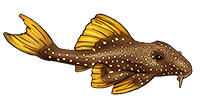L183 fungus ?
-
aquaman :3
- Posts: 5
- Joined: 12 Jan 2014, 11:31
- Location 2: Netherlands
L183 fungus ?
I noticed that my L183 has a strange white spot on his tail.
it is located at the low part of the fi
if the photo is too blurry i will try to get a better photo
edit : found out i wrote photo wrong
if the photo is too blurry i will try to get a better photo
edit : found out i wrote photo wrong
- apistomaster
- Posts: 4735
- Joined: 10 Jun 2006, 14:26
- I've donated: $90.00!
- My articles: 1
- My cats species list: 12 (i:0, k:0)
- My Wishlist: 1
- Location 1: Clarkston, WA, USA
- Location 2: Clarkston, WA, USA
- Interests: Aquaculture and flyfishing
Re: L183 fungus ?
Since you can see this best does the lesion appear to be more like a swollen vesicle or is it white, fuzzy and/ or ragged?
If it is the former it may disappear non it's own or you could use a very sharp instrument to trim it off. The excised portion of the caudal fin will regenerate. You can paint the would edge with mercurochrome, potassium permanganate or methylene blue as a disinfectant. I have seen this mostly among Corydoras species. I do not know the cause but I suspect a virus which doesn't seem contagious.
If it is definitely a fungus or bacterial infection there are any number of antifungals/antibiotics which are available OTC.
I doubt it is any of the latter two.
If it is the former it may disappear non it's own or you could use a very sharp instrument to trim it off. The excised portion of the caudal fin will regenerate. You can paint the would edge with mercurochrome, potassium permanganate or methylene blue as a disinfectant. I have seen this mostly among Corydoras species. I do not know the cause but I suspect a virus which doesn't seem contagious.
If it is definitely a fungus or bacterial infection there are any number of antifungals/antibiotics which are available OTC.
I doubt it is any of the latter two.
Avid Trout fly fisherman. ·´¯`·...¸><)))º>
-
aquaman :3
- Posts: 5
- Joined: 12 Jan 2014, 11:31
- Location 2: Netherlands
Re: L183 fungus ?
Thank you very much for your answer, the spot on its tail isn't ragged or fuzzy it seems smooth. So it will heal by itself or is it best to treat the spot.
Thank you very much!
Thank you very much!
- apistomaster
- Posts: 4735
- Joined: 10 Jun 2006, 14:26
- I've donated: $90.00!
- My articles: 1
- My cats species list: 12 (i:0, k:0)
- My Wishlist: 1
- Location 1: Clarkston, WA, USA
- Location 2: Clarkston, WA, USA
- Interests: Aquaculture and flyfishing
Re: L183 fungus ?
I would leave it alone because this type of lesion often resolves by itself.
It may become larger but could still eventually go away.
I've never seen a catfish die from this weird problem and it certainly isn't contagious in my experience.
It may become larger but could still eventually go away.
I've never seen a catfish die from this weird problem and it certainly isn't contagious in my experience.
Avid Trout fly fisherman. ·´¯`·...¸><)))º>




